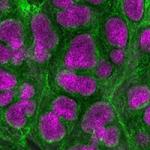
Rosa Puertollano-Moro, Ph.D.
Senior Investigator
Protein Trafficking and Organelle Biology
NHLBI
Research Topics
The main interest of Dr. Puertollano’s Research Program is to characterize the contribution of lysosomes to a variety of physiological processes, both in normal and pathological conditions. Her primary goal is to make significant advances in three major areas: 1) characterization of the molecular mechanisms of lysosomal regulation, 2) generation of animal models to better understand the molecular pathophysiology of lysosomal diseases, and 3) identification of potential sites for therapeutic intervention suitable for further evaluation in translational and clinical research efforts.
Traditionally considered mere degradative compartments, lysosomes are now recognized as key players in many cellular processes. A key finding in support of this was the discovery that expression of lysosomal genes changes in response to nutrient status, revealing that cells monitor lysosomal function and respond to degradation requirements and environmental conditions. Dr. Puertollano’s laboratory has shown that the transcription factors TFEB and TFE3 rapidly translocate from the cytosol to the nucleus following starvation. By regulating expression of genes implicated in lysosomal biogenesis and autophagy, TFEB and TFE3 play a critical role in maintaining cellular and energy homeostasis. However, TFEB and TFE3 may have a broader role than previously recognized as they are activated in response to a variety of stress conditions, including accumulation of aberrant proteins, inflammation, and pathogen infection. While the role of these transcription factors in adaptation to a wide variety of internal stresses and environmental fluctuations is inextricably linked to their unique ability to globally regulate the autophagic/lysosomal system, it is important to keep in mind that TFEB and TFE3 can also control expression of key genes involved in multiple cellular pathways, such as modulation of mitochondrial function, metabolism, unfolded protein response, apoptosis, and inflammatory response, thus suggesting a global role in stress response.
Mutations in lysosomal proteins are the cause of a class of metabolic disorders known as lysosomal storage diseases (LSDs). Dr. Puertollano’s laboratory is interested in understanding the molecular basis and cellular pathology of Mucolipidosis Type IV (MLIV) and Pompe disease. Generation and characterization of a new MLIV model in zebrafish in her laboratory revealed that that both progressive degeneration and developmental defects are important components of the MLIV pathology. She has also assessed how the role of lysosomes in signaling and cellular homeostasis may be altered in LSDs. In particular, we reported defective mTORC1 activation in Pompe disease and identified potential sites for therapeutic intervention for this disease.
Overall, this work provides significant new insight into the novel and exciting role of lysosomes as signaling centers that synchronize environmental cues with gene expression, energy production, and cellular homeostasis.
Biography
Rosa Puertollano graduated from the Universidad Autonoma de Madrid with a B.S. in biology and biochemistry and a M.S. in molecular genetics. She earned her Ph.D. in molecular biology and biochemistry from Consejo Superior de Investigaciones Cientificas and did her postdoctoral training from 1999 to 2004 in the Cell Biology and Metabolism Branch of the National Institute of Child Health and Human Development at the NIH. From 2001 to 2004 she was an NIH visiting fellow and subsequently became a tenure-track Investigator at the NHLBI. Dr. Puertollano has published over 50 research articles, reviews, and book chapters. She is a member of the editorial board of the journals Traffic and ISRN Cell Biology and a reviewer for numerous other journals. She is a member of the American Society for Cell Biology, the NIH Protein Trafficking Interest Group, and the Faculty of 1000.
Selected Publications
- Martina JA, Chen Y, Gucek M, Puertollano R. MTORC1 functions as a transcriptional regulator of autophagy by preventing nuclear transport of TFEB. Autophagy. 2012;8(6):903-14.
- Martina JA, Puertollano R. Rag GTPases mediate amino acid-dependent recruitment of TFEB and MITF to lysosomes. J Cell Biol. 2013;200(4):475-91.
- Willett R, Martina JA, Zewe JP, Wills R, Hammond GRV, Puertollano R. TFEB regulates lysosomal positioning by modulating TMEM55B expression and JIP4 recruitment to lysosomes. Nat Commun. 2017;8(1):1580.
- Meena NK, Randazzo D, Raben N, Puertollano R. AAV-mediated delivery of secreted acid α-glucosidase with enhanced uptake corrects neuromuscular pathology in Pompe mice. JCI Insight. 2023;8(16).
- Jeong E, Willett R, Rissone A, La Spina M, Puertollano R. TMEM55B links autophagy flux, lysosomal repair, and TFE3 activation in response to oxidative stress. Nat Commun. 2024;15(1):93.
Related Scientific Focus Areas


Molecular Biology and Biochemistry
View additional Principal Investigators in Molecular Biology and Biochemistry


This page was last updated on Thursday, August 21, 2025